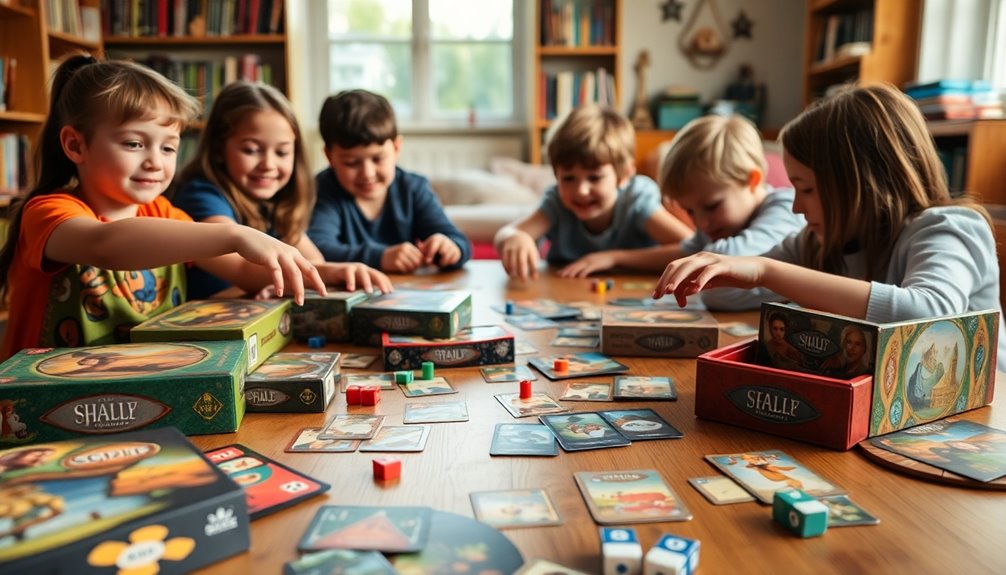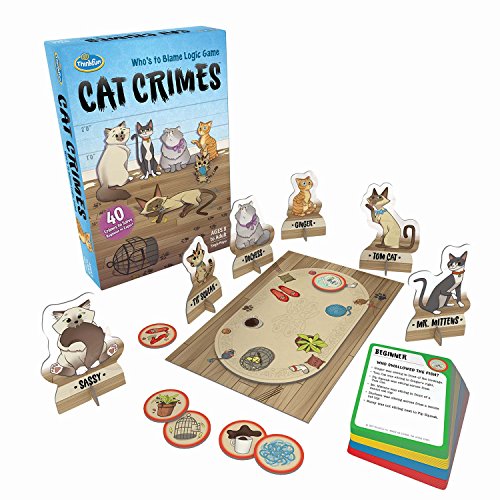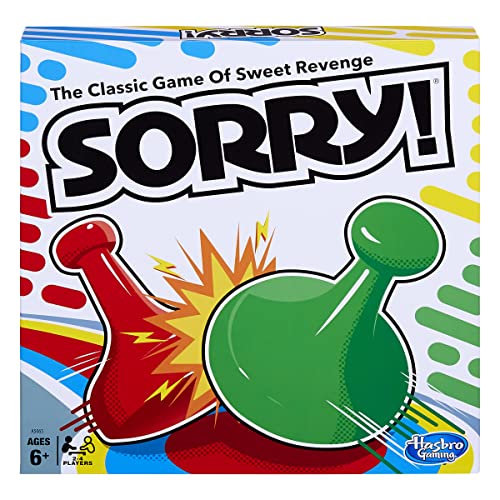If you're looking for board games that challenge your kids' minds and enhance their critical thinking skills, I've got some great recommendations. Games like STEM Board Games for kids aged 4-8, QUOKKA Conversation Cards, and the Road Builder Kids Logic Toys provide engaging problem-solving experiences. Think Fun Cat Crimes and Adsumudi Math Game are perfect for older kids too. Plus, factors like age appropriateness and educational value are key to making the right choice. Keep exploring to discover even more amazing options!
Key Takeaways
- Look for games that offer a range of problem-solving challenges to enhance logical reasoning and strategic planning skills for kids.
- Ensure age-appropriateness to match children's developmental milestones, maximizing engagement and learning effectiveness.
- Choose games with varying difficulty levels to cater to different skill sets and provide a gradual increase in cognitive challenges.
- Consider both cooperative and competitive games to foster teamwork or rivalry, influencing social dynamics during playtime.
- Prioritize high-quality materials and durable components to ensure safety and longevity, allowing for rigorous play without interruptions.
STEM Board Games and Puzzle Toys for Kids (4-8 Years Old)
When I think about the best board games for kids aged 4-8, STEM board games and puzzle toys really stand out. These games not only develop thinking skills but also encourage kids to explore independently, sparking their creativity and concentration. With over 118 challenges that grow in difficulty, children can start at their own pace. The vibrant, well-crafted pieces fit perfectly in small hands, making playtime engaging. I love how these games promote family bonding while nurturing a love for learning. They're a fantastic gift option, suitable for all kids, including those with diverse needs.
Best For: Children aged 4-8 years old, including those with diverse needs, looking for engaging and educational play experiences.
Pros:
- Promotes independent exploration and self-directed learning through hands-on activities.
- Offers over 118 challenges with varying difficulty levels, catering to different skill sets and encouraging progression.
- Sparks family bonding moments while nurturing a love for STEM subjects.
Cons:
- Some users report frustration with the size of the set, suggesting a larger version might enhance the experience.
- The complexity of certain challenges may overwhelm younger children if not guided properly.
- Limited appeal for older children or those who prefer more competitive or fast-paced games.
QUOKKA Conversation Cards Game – Kids Edition
The QUOKKA Conversation Cards Game – Kids Edition is perfect for families who want to spark engaging discussions and strengthen connections. With 500 thought-provoking questions divided into five themes, it transforms family nights into memorable bonding experiences. I love how it encourages everyone to share their thoughts on everything from emotions to future dreams. Whether we're at home or on a road trip, the travel version keeps our conversations lively and meaningful. Plus, it's accessible for kids of all ages, making it a fantastic way to deepen our relationships. I highly recommend it for anyone looking to enrich family communication!
Best For: Families looking to enhance communication and foster deeper connections through engaging discussions.
Pros:
- Encourages open communication among family members, helping them understand each other better.
- Versatile usage makes it suitable for family game nights, road trips, or casual gatherings.
- 500 thought-provoking questions promote varied discussions across different themes, keeping conversations fresh and engaging.
Cons:
- Some questions may be more suited for couples, potentially limiting relevance for all family members.
- The volume of questions might be overwhelming for younger kids or those who are less talkative.
- Requires active participation from all family members, which may be challenging in larger or less communicative families.
Road Builder Kids Logic Toys, Large Puzzle STEM Board Games
If you're looking for a board game that not only entertains but also educates, Road Builder Kids Logic Toys is an excellent choice for children aged 4 to 8. This large puzzle STEM game encourages kids to explore route design while developing their problem-solving skills. I love how it promotes creativity and fine motor skills through hands-on play. With over 200 challenges, kids stay engaged as they navigate complex routes. It's compatible with common building blocks, allowing for endless scene creation. Plus, it's a fantastic gift that fosters a love for STEM subjects, making learning fun and interactive!
Best For: Children aged 4 to 8 who enjoy hands-on learning and problem-solving through creative play.
Pros:
- Encourages independent exploration and self-directed learning.
- Develops fine motor skills and creativity through interactive gameplay.
- Offers over 200 challenges, ensuring long-lasting engagement and entertainment.
Cons:
- Some users reported difficulties with the pull-back car impacting gameplay.
- May be complex for younger children without adult assistance.
- Requires a larger space for setup due to the size of the baseboard.
STEM Board Games Kids Toys – Build-A-Track Brain Teaser Puzzles for Ages 4-8
For kids aged 4-8, STEM Board Games like Build-A-Track Brain Teaser Puzzles stand out as a fantastic choice because they blend fun with educational value. With 118 challenges across five difficulty levels, this game sharpens logical thinking and problem-solving skills. As my kids build routes and navigate maze-like puzzles, I notice their focus and spatial recognition improving. The sturdy pieces guarantee durability, making it a great investment for family fun. Plus, it's ideal for children with special needs, promoting creativity and imagination. Overall, Build-A-Track offers an engaging, hands-on learning experience that keeps kids entertained for hours.
Best For: This product is best for children aged 4-8, especially those who enjoy problem-solving and creative play.
Pros:
- Engages children with 118 challenges across five difficulty levels, enhancing logical thinking and problem-solving skills.
- Durable and sturdy pieces ensure long-lasting play, making it a great investment for family activities.
- Promotes creativity and imagination, making it suitable for children with special needs, including ADD, ADHD, and autism.
Cons:
- Some users reported issues with the mechanical parts of the squirrels, leading to operational difficulties after limited use.
- While many challenges cater to various age groups, some may be too easy for older children, potentially limiting engagement.
- Feedback on durability varies, with some parents expressing concerns about the longevity of certain pieces.
Think Fun Cat Crimes Brain Game for Ages 8 and Up
What makes Think Fun Cat Crimes stand out as one of the best board games for kids is its ability to engage young minds through fun and humor. This brain game, designed for ages 8 and up, features adorable cat pieces and clever challenges that develop critical reasoning and problem-solving skills. I love how players can work solo or as a team to solve the mysteries without any competition. With 40 challenges ranging from beginner to expert, it keeps everyone engaged. Plus, its compact design makes it perfect for on-the-go play, ensuring fun family bonding anywhere we go!
Best For: Families and children aged 8 and up who enjoy problem-solving games that promote critical thinking and teamwork.
Pros:
- Encourages development of critical reasoning and problem-solving skills.
- Provides flexible gameplay options, allowing for solo or collaborative play without competition.
- Compact design makes it easy to transport for on-the-go family fun.
Cons:
- Younger children may find reliance on trial and error frustrating.
- Small pieces can pose a choking hazard for very young kids.
- Some challenges may be too difficult for beginners, leading to potential discouragement.
Mattel Games Blokus XL Strategy Board Game
Mattel Games Blokus XL Strategy Board Game stands out as an excellent choice for families seeking an engaging and strategic game that appeals to both kids and adults. The larger board and oversized pieces make it easy for younger players to join in. With just one simple rule—pieces must touch at corners—the game quickly becomes a thrilling challenge. I love how it promotes critical thinking and problem-solving as we strategize our moves. It's perfect for family game nights, accommodating 2 to 4 players. The competition is fierce, but the fun is always guaranteed, making it a staple in our household.
Best For: Families and friends looking for an engaging board game that combines strategy and fun for players aged 7 and up.
Pros:
- Encourages critical thinking and strategic planning.
- Oversized pieces are easy for younger players to handle.
- Quick to learn, making it accessible for all ages.
Cons:
- Some users reported issues with warped pieces affecting gameplay.
- Best experienced with 4 players, which may limit options for smaller groups.
- Limited replayability for some players once strategies are mastered.
52 Essential Critical Thinking Flash Cards by Harvard Educator
The Essential Critical Thinking Flash Cards by Harvard Educator stand out as an exceptional choice for anyone keen to enhance their critical thinking skills, whether you're a student, teacher, or parent. With 52 cards designed to reveal cognitive biases and improve decision-making, these cards offer engaging gameplay for all ages, from beginner to expert. They connect well with various subjects, making them perfect for classroom use or family discussions. Users praise their sturdy design and ability to spark stimulating conversations. I highly recommend incorporating these cards into your daily routine for a fun way to build critical thinking and emotional resilience.
Best For: Individuals of all ages seeking to enhance their critical thinking skills, including students, educators, and families.
Pros:
- Engaging Gameplay: Offers fun and interactive ways to improve critical thinking across various age levels.
- Versatile Use: Applicable in multiple subjects such as English Language Arts, Social Studies, and Media Literacy, making it ideal for both classroom and home settings.
- High-Quality Design: Users appreciate the sturdy construction and appealing design of the cards, which enhances the overall experience.
Cons:
- Durability Concerns: Some users have noted that the cards may not withstand regular use over time.
- Limited Initial Content: While the game includes a variety of scenarios, some users may seek additional cards or expansions for more comprehensive learning.
- Potential Overwhelm: Beginners might feel overwhelmed by the range of concepts and levels, requiring guidance for effective use.
Learning Resources iTrax Critical Thinking Game for Kids
Perfect for kids aged 6 and up, the Learning Resources iTrax Critical Thinking Game is an excellent choice for fostering essential skills like problem-solving and critical thinking. With 69 pieces and 25 double-sided pattern cards, it challenges kids to connect blocks and recreate paths quickly. I love how it encourages perseverance and visual perception, making it great for therapy or small group activities. While some children might lose interest, many find it a fun challenge. Just a heads up, younger players may need some adult help. Overall, it's a fantastic educational gift that promotes collaboration and learning.
Best For: The Learning Resources iTrax Critical Thinking Game is best for children aged 6 and up who are looking to enhance their problem-solving and critical thinking skills through engaging play.
Pros:
- Encourages critical thinking, problem-solving, and perseverance.
- Versatile for use in therapy settings, tutoring, and small group activities.
- Engaging and fun challenge for children, promoting collaboration and learning.
Cons:
- Some children may lose interest over time.
- Younger players might require adult assistance to fully enjoy the game.
- Reports of insufficient pieces to complete all patterns, leading to disappointment.
Linked Math Game for Kids Ages 7
For kids ages 7 and up who are enthusiastic to improve their math skills while having fun, the Linked Math Game is a fantastic choice. This game focuses on essential math operations like addition, subtraction, multiplication, and division, making it perfect for various skill levels. I love that it accommodates 2 to 8 players, so it's great for family game nights or classroom settings. It enhances problem-solving abilities and boosts math confidence. Plus, with adaptable difficulty levels, kids can progress as they learn. Parents and educators rave about how engaging it is, making math enjoyable and effective!
Best For: Kids ages 7 and up who want to improve their math skills in a fun and engaging way.
Pros:
- Engages 2 to 8 players, making it suitable for families and classrooms.
- Enhances problem-solving and critical thinking skills while boosting math confidence.
- Adaptable difficulty levels allow for progression as children develop their math abilities.
Cons:
- May require adult supervision or guidance for younger players to understand the rules.
- Limited to basic arithmetic operations, which may not challenge advanced learners.
- Some players might prefer digital games over traditional board game formats.
ThinkFun Rush Hour Traffic Jam Logic Game for Kids Age 8 and Up
Looking for a board game that sparks creativity and sharpens critical thinking? ThinkFun's Rush Hour Traffic Jam Logic Game is perfect for kids aged 8 and up. This engaging STEM toy challenges players to slide cars and trucks, clearing a path for the red car through 40 progressively difficult puzzles. It's a fantastic way to develop logical reasoning and strategic thinking while having fun. Plus, it's suitable for all ages, making it a great family activity. With accolades like the Parents Choice Award and over 50 million units sold, this game is a hit for both kids and adults alike!
Best For: Kids aged 8 and up who enjoy engaging puzzles that enhance their critical thinking and reasoning skills.
Pros:
- Engaging Gameplay: Offers 40 challenging puzzles that cater to various skill levels, keeping players entertained.
- Family-Friendly: Suitable for all ages, making it a great option for family bonding and screen-free time.
- Skill Development: Promotes logical reasoning and strategic thinking in a fun and interactive way.
Cons:
- Limited Players: Typically designed for solo play or one-on-one, which may not be ideal for larger groups.
- Challenge Progression: Some users may find the progression from beginner to expert levels can be steep.
- Physical Space: Requires a flat surface to play, which may limit where it can be enjoyed.
Blockwork by Uzzle Games – Fast-Paced Family Board Game
Blockwork by Uzzle Games stands out as an engaging choice for families, especially those with kids aged 4 and up. I love how this fast-paced game challenges us to stack and match colorful blocks while racing against the clock. The structure cards cater to different skill levels, ensuring everyone from beginners to experts has a blast. Plus, its colorblind-friendly design makes it accessible for all. I appreciate that it promotes problem-solving and strategic thinking in a fun way. With its compact size, we can take it anywhere, making it perfect for family game nights or travel.
Best For: Families with children aged 4 and up who enjoy fast-paced, interactive board games that promote strategic thinking.
Pros:
- Colorblind-friendly design ensures accessibility for all players.
- Variety of structure cards allows for different skill levels, making it enjoyable for everyone from beginners to experts.
- Compact size makes it easy to transport for travel or family game nights.
Cons:
- May be too fast-paced for younger children who are still developing fine motor skills.
- Limited player count (2 to 4) may not accommodate larger family gatherings.
- Repetitive gameplay might not appeal to players seeking more complex strategy games.
Exciting Zoo-Themed Family Friendly Board Game for Ages 5
If you're searching for a delightful way to engage young children in family game nights, Keeper Chaos fits the bill perfectly. This zoo-themed board game, suitable for ages 5 and up, brings laughter and excitement to any gathering. With simple rules and vibrant animal illustrations, kids quickly catch on, making it easy for pre-readers to join in. Each game lasts only 15-30 minutes, ensuring you can play multiple rounds without losing interest. Plus, the blend of strategy and luck keeps everyone involved. Trust me, Keeper Chaos is a fantastic choice that promises unforgettable family moments while boosting critical thinking skills!
Best For: Families with young children looking for a fun and engaging board game that promotes quality time and learning.
Pros:
- Easy to understand: Simple rules allow for quick engagement from players of all ages, especially pre-readers.
- Short playtime: Games last only 15-30 minutes, making it convenient for busy families and perfect for multiple rounds in one sitting.
- Encourages skill development: Blends strategy and luck, helping children develop cognitive and social skills through decision-making and problem-solving.
Cons:
- Limited player count: The game accommodates only 2 to 5 players, which may not be ideal for larger family gatherings.
- Age restriction: While suitable for ages 5 and up, it may not provide enough challenge for older children or adults.
- Repetitive gameplay: Some players may find the gameplay can become repetitive after multiple rounds.
Adsumudi Math Game for Kids (Ages 4 and Up)
The Adsumudi Math Game is perfect for kids aged 4 and up, making it an excellent choice for parents keen to enhance their children's math skills through playful engagement. This game focuses on addition, subtraction, and mental math using 52 double-sided cards, offering 208 unique challenges. I love how it gradually increases difficulty, helping my kids build confidence and critical thinking. With options to play collaboratively, competitively, or individually, it fits seamlessly into preschool, Montessori, or homeschool settings. Plus, it's durable and eco-friendly, making it a sustainable choice for family game nights or travel adventures!
Best For: Parents looking to enhance their children's math skills in a fun and engaging way, suitable for kids aged 4 and up.
Pros:
- Multiple gameplay options encourage collaboration and competition among children.
- Gradually increasing difficulty helps build confidence and critical thinking skills.
- Eco-friendly materials and durable design make it suitable for family game nights and travel.
Cons:
- Limited to math skills focused on numbers 1 to 20, which may not challenge older or more advanced learners.
- Requires adult supervision or guidance for younger children to understand the rules.
- The game may not appeal to children who are not interested in math-related activities.
Skillmatics Card Game – Found It Indoor Scavenger Hunt for Kids
Looking for an engaging game that captivates young minds? The Skillmatics Card Game – Found It Indoor Scavenger Hunt is perfect for kids aged 4-7! With prompts like "find something with a pattern," it boosts observation and problem-solving skills while keeping them active indoors. I love how it encourages teamwork, making it ideal for family game nights. Plus, it's won the 2023 NAPPA award, highlighting its educational value. With 50 vibrant cards, it's travel-friendly and perfect for playdates or homeschooling. Trust me, your kids will have hours of hands-on fun while learning essential skills!
Best For: Kids aged 4-7 who enjoy interactive and educational indoor activities.
Pros:
- Promotes observation, logical reasoning, and problem-solving skills.
- Encourages teamwork and family bonding during playtime.
- Travel-friendly design makes it easy to take on road trips and playdates.
Cons:
- Limited to indoor play, which may not appeal to all children.
- May require adult supervision for younger kids to ensure safety and understanding of prompts.
- Potentially repetitive for older children or those who quickly master the prompts.
Sorry! Kids Board Game for 2 to 4 Players
is a fantastic choice for families with kids aged 6 and up, providing hours of entertainment for 2 to 4 players. The goal is simple: race your pawns from start to home, but watch out for opponents who can send you back! I love how the game combines luck and strategy, with cards dictating each move. It's easy for my kids to grasp, making family game nights a blast. Plus, with high ratings and quality components from Hasbro, it stands the test of time. Sorry! brings out playful rivalry and keeps everyone engaged, making it a must-have for our collection.
Best For: Families with kids aged 6 and up looking for an engaging and strategic board game experience.
Pros:
- Easy to learn: Simple rules make it accessible for young children, encouraging independent play.
- Engaging gameplay: Combines luck and strategy, ensuring that each game is unpredictable and exciting.
- Quality components: Durable materials and vibrant artwork enhance the overall gaming experience.
Cons:
- Limited player count: Designed for only 2 to 4 players, which might not accommodate larger family gatherings.
- Potential for frustration: Players can be sent back to start, which may lead to feelings of disappointment for younger participants.
- Repetitive gameplay: Some may find the game can become predictable after multiple plays, reducing long-term interest.
Factors to Consider When Choosing Board Games for Critical Thinking for Kids

When I pick board games that boost critical thinking for kids, I consider several key factors. Age appropriateness and gameplay complexity are vital to guarantee the game is challenging yet accessible. I also think about the educational value, engagement duration, and whether the game promotes cooperative or competitive play.
Age Appropriateness
Choosing age-appropriate board games for kids is essential in fostering critical thinking skills. When I pick games, I always make sure they match my child's developmental milestones. For younger kids, like those aged 4-6, I look for games that emphasize basic problem-solving and logical reasoning. As they grow, around age 7 and up, I introduce more complex strategies and cognitive challenges. I also pay attention to the recommended age range from the manufacturer; it really helps me select engaging and educational games. Plus, I love finding games that accommodate different ages, allowing for collaborative play. This not only enhances family bonding but also guarantees everyone is challenged at their own level.
Gameplay Complexity Levels
Finding age-appropriate games is just the beginning; the complexity levels of gameplay play a significant role in fostering critical thinking skills in kids. When I look for board games, I consider their varying difficulty tiers. Games with multiple complexity levels let younger players start with simpler challenges while older kids face more intricate problems. I appreciate games that offer clear instructions and gradually increase in difficulty, helping children build confidence and critical thinking skills over time. Additionally, I seek out games that blend strategic decision-making with problem-solving elements, as they encourage deeper cognitive engagement. Cooperative and competitive games also enrich the experience, allowing kids to navigate social dynamics while enhancing their critical thinking abilities.
Educational Value
To guarantee a board game truly enhances critical thinking skills in kids, I focus on its educational value. I look for games that incorporate problem-solving challenges, as they help kids develop logical reasoning and strategic planning. It's vital to choose games with multiple difficulty levels; this allows children to progress at their own pace, keeping them engaged while honing their critical thinking abilities. I also appreciate games that promote collaborative play, as they foster communication and teamwork—essential skills in critical thinking. Engaging themes and hands-on activities motivate kids to think creatively and tackle problems from various angles. Ultimately, I want games that not only entertain but also boost kids' focus and concentration in real-life situations.
Engagement Duration
When it comes to selecting board games that enhance critical thinking in kids, engagement duration is a key factor. I've noticed that some games offer quick play sessions of just 15-30 minutes, while others can stretch over an hour. Games that keep kids interested usually have various difficulty levels, which encourages them to tackle new challenges. Interactive elements, whether collaborative or competitive, also boost engagement by making kids want to play again and again. Plus, varied themes and mechanics can captivate young minds, drawing them into the game's narrative. I find that games allowing for creative expression or customization are particularly effective, as they let children experiment with different strategies and outcomes, keeping them engaged for longer.
Cooperative vs. Competitive Play
Choosing between cooperative and competitive play can considerably impact how kids develop critical thinking skills through board games. Cooperative games encourage teamwork and communication, allowing children to work together towards a common goal. This fosters social skills and creates a sense of shared achievement, often leading to higher engagement and satisfaction. On the other hand, competitive games promote individual critical thinking and strategic decision-making. Kids learn to assess their moves in relation to opponents, and they grasp the importance of handling both winning and losing gracefully. I've found that games balancing both elements provide diverse experiences, helping children adapt to various social dynamics while enhancing their flexibility in thinking. Ultimately, the choice should align with your child's personality and developmental needs.
Material Quality and Durability
Material quality and durability play a pivotal role in selecting board games for kids, especially those designed to enhance critical thinking skills. I always look for games made with sturdy components that can withstand rigorous play. High-quality materials, like thick cardboard and strong plastics, not only guarantee longevity but also keep kids safe, particularly younger ones who might chew or mishandle pieces. Well-crafted pieces and vibrant colors add to the visual appeal and tactile engagement, making the experience more enjoyable. Plus, durable game components prevent wear and tear, which can interrupt gameplay and lead to frustration. Investing in games known for their quality guarantees that my family can enjoy them for years, fostering critical thinking through repeated play without constant replacements.
Frequently Asked Questions
What Age Group Is Best Suited for Critical Thinking Board Games?
I believe critical thinking board games can suit a wide range of ages, but I've found they're particularly effective for kids around 8 to 12 years old. At this age, they're starting to develop their reasoning skills and can grasp more complex strategies. However, younger kids can also benefit from simpler games that encourage problem-solving. It's all about finding the right game that matches their cognitive level and interests!
How Can Parents Encourage Kids to Engage With These Games?
Imagine watching your child's eyes light up as they solve a tricky puzzle. To encourage kids to engage with board games, I make it a family affair. We set aside game nights, allowing everyone to join in. I choose games that spark their interests and challenge their minds. I also offer gentle guidance, asking questions that prompt them to think deeper. It's amazing to see their confidence grow with every game we play together!
Are There Any Online Versions of These Critical Thinking Games?
Absolutely, there are plenty of online versions of critical thinking games! I've found several platforms that offer digital adaptations of classic board games. Websites like Tabletop Simulator and Board Game Arena let you play with friends or family virtually. I enjoy exploring these options, especially since they often include tutorials that help new players learn the rules. Plus, playing online makes it easy to connect with others who love these games as much as I do!
How Do These Games Improve Problem-Solving Skills?
You wouldn't believe how much my problem-solving skills have sharpened! These games push me to think critically and adapt my strategies. Each move requires careful consideration, forcing me to analyze the situation and predict outcomes. I've noticed how I approach real-life challenges with the same mindset. It's fascinating how a simple game can ignite my creativity and logic, transforming my thought process. Trust me, the improvement is both surprising and rewarding!
What Are the Recommended Playtimes for These Board Games?
When it comes to board games, I've noticed that recommended playtimes can vary quite a bit. Most games usually suggest around 30 minutes to an hour, but some can stretch longer, especially if you're really getting into it. I've found that shorter games keep everyone engaged, while longer ones offer a deeper experience. It's all about balancing fun and focus, so I like to choose based on the mood of the group.
Conclusion
In choosing the right board games for your kids, remember to seek out fun, foster creativity, and encourage critical thinking. Look for games that challenge their minds, spark their curiosity, and promote teamwork. By engaging with these games, your children won't just play; they'll learn, they'll explore, and they'll grow. So, immerse yourself in these exciting options, watch their confidence soar, and enjoy the quality time spent together. After all, great memories are made through play!

























